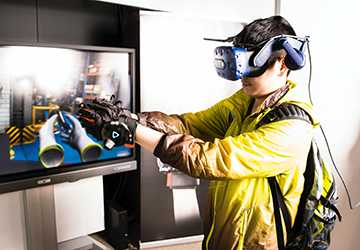Virtual Reality (VR) has emerged as a transformational force in various industries, revolutionizing how businesses operate and interact with customers. This article delves into why companies should embrace VR and highlights its innovative applications. From immersive training experiences to enhanced customer engagement, VR offers many opportunities to stay ahead in the ever-evolving business landscape. Let's dive into the world of VR and discover how it can reshape your business for the better.

Enhancing Training and Education
VR revolutionizes
training and education by providing immersive and interactive learning experiences. Trainees can step into realistic simulations that mimic real-world scenarios, enhancing knowledge retention.
Healthcare Training
Medical professionals can practice complex procedures in a risk-free VR environment in fields like healthcare, improving their skills and patient outcomes.
Streamlining Product Prototyping and Design
3D Modeling and Visualization
Businesses can create 3D models and visualize products virtually, streamlining the design process and reducing development time and costs.
Efficient Collaboration
Designers and teams can collaborate seamlessly in this virtual environment, iterating quickly and efficiently.
Facilitating Virtual Meetings and Collaboration
Global Team Collaboration
Teams scattered across the globe can meet in a shared virtual space, fostering real-time collaboration and improving productivity.
Enhanced Communication
Interacting naturally in a virtual setting makes business discussions more effective, enhancing communication among remote employees.
Elevating Customer Engagement and Marketing
Immersive Product Experiences
VR provides businesses with a powerful tool for customer engagement and marketing. Immersive experiences allow customers to engage with products or services before purchasing.
Real Estate and Property Tours
Real estate agents can provide virtual property tours, enticing potential buyers and saving time and resources.
Transforming Healthcare and Medical Training
VR benefits the healthcare industry
by offering realistic surgical simulations. Surgeons can refine their skills through virtual surgery simulations, leading to better patient outcomes.
Medical Education
Medical education is enhanced through VR, providing students with a better understanding of medical procedures and conditions.
Revolutionizing Tourism and Real Estate
Virtual Property Tours
Virtual property tours enable potential buyers to explore properties remotely, saving both buyers and sellers time and resources.
Immersive Travel Experiences
The tourism industry uses VR to provide immersive travel experiences, enticing tourists with virtual adventures and enhancing the visibility of destinations.
Enhancing Data Visualization and Analytics
3D Data Visualization:
VR offers immersive 3D data visualization, enabling more effective data analysis and informed decision-making in various industries.
Informed Decision-Making
This innovative approach to data analysis leads to more informed choices in industries where data plays a crucial role.
Reducing Travel and Costs
Eliminating Travel Expenses
Virtual meetings and training significantly reduce the need for physical travel, eliminating travel expenses and accommodations.
Increased Productivity:
By eliminating the need for extensive travel, employees can redirect the time saved towards more valuable tasks, ultimately boosting productivity and efficiency within the organization.

Safety Training and Risk Mitigation
Realistic Hazard Simulations:
VR enables businesses to create highly realistic hazard simulations, allowing employees to experience and learn how to respond to dangerous situations. This hands-on training significantly reduces workplace accidents and improves overall safety.
Improved Safety Records:
VR training simulations allow employees to practice safety procedures in realistic scenarios, leading to improved safety records and a safer work environment. This can significantly reduce accidents and injuries, benefiting both employees and employers.
Expanding Entertainment and Gaming
Endless Entertainment:
The introduction of VR content has fueled the expansion of the gaming market, offering users an array of endless entertainment options. VR gaming takes immersive experiences to new heights, captivating players with interactive adventures and simulations that push the boundaries of traditional gaming.
Immersive Gaming Experiences:
VR has been embraced by the entertainment industry, revolutionizing gaming with immersive experiences that provide new creative avenues for game developers and innovative monetization strategies. Players can now step into virtual worlds and engage with games in ways previously unattainable.
Innovative Customer Support
Personalized Assistance:
In customer support, businesses increasingly turn to VR to offer personalized assistance. Powered by AI and VR technologies, virtual customer support agents provide tailored guidance to users facing troubleshooting or technical issues. This immersive approach enhances the customer experience and streamlines problem resolution. Users receive step-by-step instructions and demonstrations in a virtual environment, making complex problem-solving more accessible and efficient. VR transforms customer support into an interactive and engaging journey, ultimately boosting customer satisfaction.
Enhanced Customer Satisfaction:
Implementing VR in customer support enhances customer satisfaction and improves support efficiency. This innovative approach transforms how businesses deliver assistance, making it more interactive and engaging. Users receive help in a virtual environment that guides them through troubleshooting or technical issues. This immersive experience streamlines problem resolution and ensures that customers have a more enjoyable and practical support experience. As a result, businesses can achieve higher customer satisfaction rates and build stronger relationships with their clientele.
Gaining a Competitive Advantage
Demonstrating Innovation:
Embracing VR technology in business operations showcases a commitment to innovation and sets companies apart from competitors. Being an early adopter of VR demonstrates a forward-thinking approach and a willingness to explore cutting-edge solutions, which can attract customers and partners who value innovation.
Attracting Tech-Savvy Customers:
Embracing VR technology in business operations sets companies apart and attracts tech-savvy customers and partners. In a digital age where innovation is highly regarded, tech-savvy individuals are likelier to engage with businesses that leverage VR for enhanced experiences and solutions. This can lead to a broader customer base and collaborations with like-minded partners who value cutting-edge technology.
Conclusion
In conclusion, Virtual Reality in Business offers many advantages, making it a valuable tool across diverse industries. Whether it's revolutionizing training, improving customer engagement, or reducing costs, VR's impact is undeniable. As technology advances, embracing VR is not just a trend; it's a strategic move toward a more immersive and efficient future. Businesses that incorporate VR into their operations position themselves for success in an increasingly competitive world.












